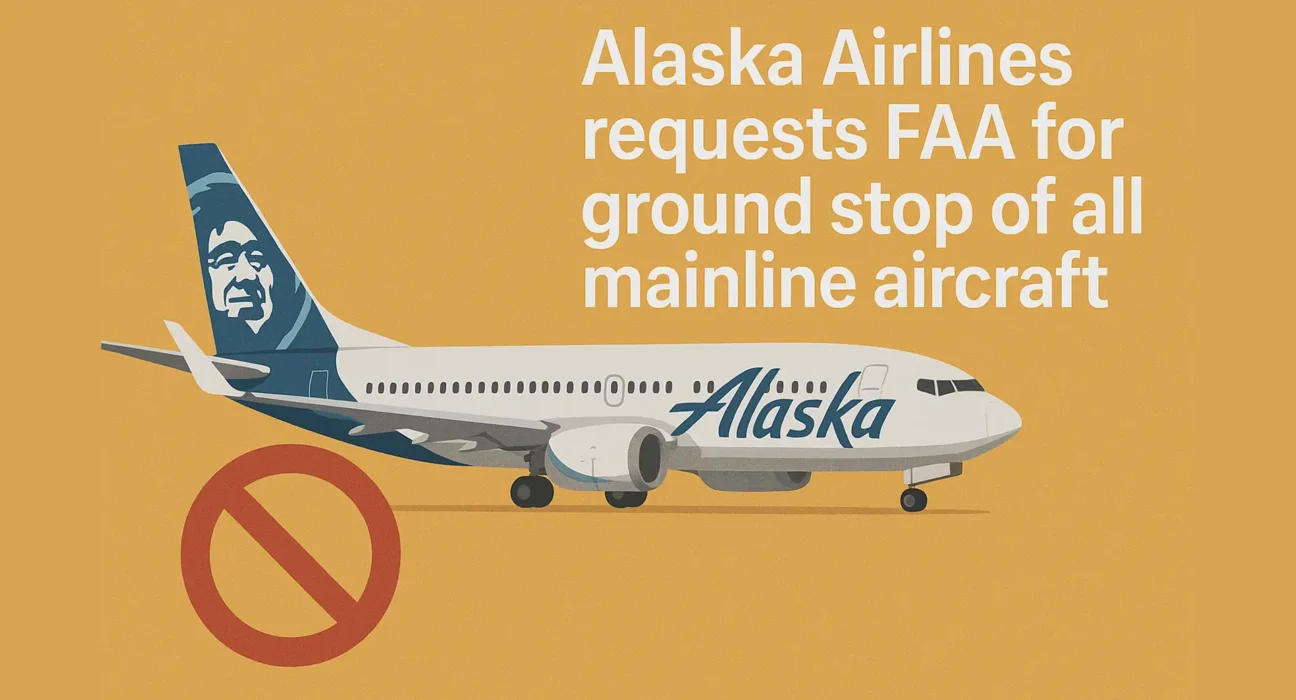In a surprising turn of events, Alaska Airlines made headlines by requesting a ground stop from the Federal Aviation Administration (FAA) for all its mainline aircraft. If you’ve booked a flight or are simply curious about what this means, buckle up—we’re diving into the turbulence behind this aviation shakeup.
What Is a Ground Stop and Why Is It Important?
Let’s start with the basics. A ground stop is essentially a command to keep planes on the ground. Think of it as putting a massive pause button on airline operations. It can be initiated by the FAA due to weather, technical issues, or—like in this case—a request from the airline itself. And when it involves Alaska Airlines, one of America’s key regional players, it’s a big deal.
The Shocking Request: Alaska Airlines Grounds Its Fleet
Late on Sunday, July 20, Alaska Airlines requested a ground stop for all of its mainline aircraft, according to the FAA’s official status page. This wasn’t a drill or a routine maintenance delay—this was an all-hands-on-deck situation.
Not only that, Horizon Air, Alaska’s regional arm, also made a similar request, further amplifying the scope of the issue. Together, these carriers operate a fleet of 238 Boeing 737s and 87 Embraer 175 aircraft. That’s a lot of planes to freeze mid-schedule.
Also read this: SpaceX Faces Scrutiny: Rising Worker Injuries at Starbase Raise Safety Concerns
Passengers Left in Limbo
Can you imagine being at the airport, bags checked, gate in sight, and suddenly everything just… stops? That’s what many passengers experienced. With Alaska Airlines grounded, flights were canceled, delayed, or rerouted. Social media lit up with frustrated and confused travelers sharing their experiences.
For many, this was more than just an inconvenience. Business trips were disrupted. Family reunions postponed. Vacations ruined. When an Alaska ground stop happens on this scale, it creates a domino effect across the country.
Why Did Alaska Airlines Do This?
So here’s the million-dollar question: Why would Alaska Airlines request a ground stop on its own operations?
Unfortunately, the answer isn’t crystal clear—yet. As of this writing, no official reason has been given by Alaska Airlines, Horizon Air, or the FAA. But that doesn’t stop speculation from taking flight.
Was It a Technical Glitch or Something Bigger?
Some aviation insiders are pointing toward a technical malfunction or IT disruption. That theory gained traction after Hawaiian Airlines, a subsidiary of Alaska Air Group, recently suffered a cybersecurity breach. While there’s no confirmed connection, the timeline is suspiciously close.
In June, Alaska Air acknowledged that it was still assessing the financial impact of that hack. Could this ground stop be a ripple effect of compromised systems? Only time—and transparency—will tell.
How Often Do Ground Stops Like This Happen?
Not very often. Especially not when airlines initiate them voluntarily. Most ground stops are due to weather conditions, ATC (Air Traffic Control) issues, or runway closures. For an airline to proactively request one? That’s rare—and potentially indicative of a serious underlying issue.
Alaska Airlines’ Reputation on the Line
Let’s be honest: Alaska Airlines has long prided itself on reliability and customer service. This unexpected move threatens to tarnish that image. Passengers expect hiccups in air travel, but a full-scale ground stop? That shakes confidence.
With Alaska Airlines grounded, the company faces tough questions. Transparency, accountability, and swift action will be critical in regaining public trust.
The Ripple Effect Across the Industry
When one carrier stops, others feel it. Flight schedules are tightly interwoven. Delays from Alaska Air can easily cascade into missed connections on partner airlines, crowded terminals, and overloaded customer service lines. This isn’t just Alaska’s problem—it’s the entire ecosystem’s headache.
What’s Next for Alaska Airlines?
The coming days will be crucial. Alaska Airlines needs to:
- Clearly communicate the cause of the ground stop.
- Ensure passenger compensation and rescheduling are handled smoothly.
- Restore public confidence before further brand damage is done.
One thing’s for sure: all eyes will be on their next move.
Should Travelers Be Worried?
Not necessarily. If this was a preemptive move to protect passengers, it may end up being a smart, safety-first decision. Better safe on the ground than sorry in the sky, right?
But if the cause turns out to be cybersecurity-related, that opens up a whole different conversation about aviation security in the digital age.
How You Can Stay Updated
The best way to stay ahead of this? Sign up for Alaska Airlines’ travel alerts, monitor the FAA status page, and follow reliable aviation reporters. You don’t want to be the last to know when your flight’s been grounded.
Conclusion: A Storm in the Skies or Just a Safety Check?
The Alaska Airlines ground stop is more than a blip on the radar. It’s a wake-up call—reminding us how fragile and complex air travel truly is. Whether it was a tech issue, a cyber threat, or just an abundance of caution, one thing is clear: Alaska needs to answer some big questions, and fast.
Until then, travelers are left grounded—not just physically, but in confusion. Let’s hope clarity takes off soon.
FAQs
1. What is a ground stop and who issues it?
A ground stop is a directive that keeps aircraft from taking off, usually issued by the FAA for safety or technical reasons. In rare cases, airlines like Alaska can request one themselves.
2. Why did Alaska Airlines request a ground stop?
As of now, the official reason is unknown. Speculation includes IT issues or cybersecurity concerns, especially after a recent hack impacted one of its subsidiaries.
3. How many aircraft were affected by the Alaska Airlines ground stop?
Approximately 238 Boeing 737s and 87 Embraer 175s—the entire mainline and Horizon Air fleet—were grounded.
4. Will this impact Alaska Airlines’ future flights?
That depends on the cause and how swiftly it’s resolved. Ground stops can create schedule backlogs that ripple into future days.
5. Should I cancel my Alaska Airlines flight?
Not necessarily. Check with Alaska’s official communication channels for the latest updates before making any decisions.
6. Was Horizon Air also grounded?
Yes, Horizon Air, which operates regional flights for Alaska, was also affected by a separate but simultaneous ground stop request.





